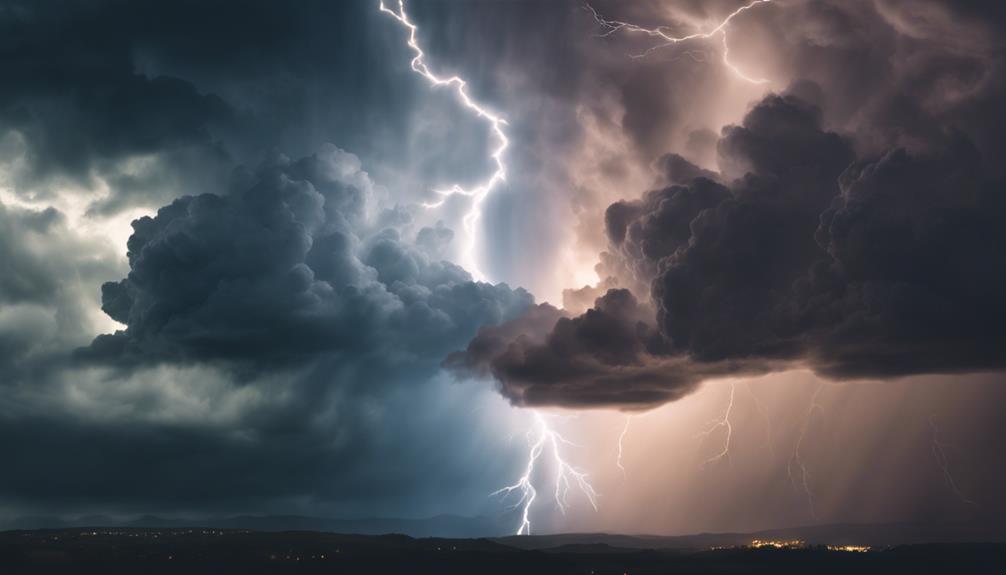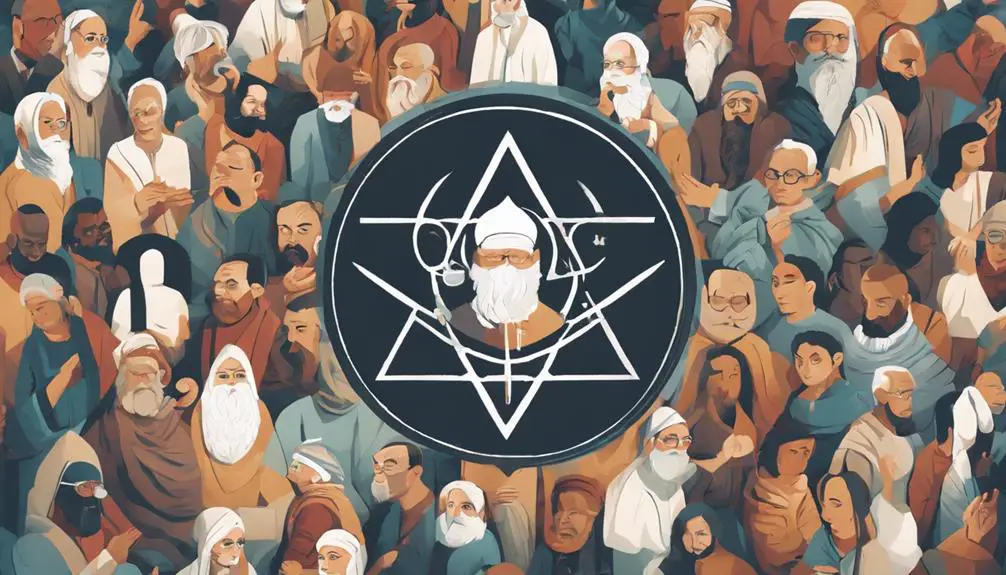Ponder the age-old question of whether blasphemy is truly a sin, delving into the complexities of religion, society, and the power of words.

Is Blasphemy a Sin?
As the saying goes, 'The tongue has no bones, but it is strong enough to break a heart.'
In your journey to understand whether blasphemy is a sin, you'll find that words and their impact transcend physical boundaries, touching the very essence of what societies and religions hold sacred.
From historical perspectives to religious teachings, and the shifts brought about by modern views and secularism, the discourse surrounding blasphemy is as complex as it is controversial.
As you consider the varied dimensions of this topic, you're invited to explore how something as intangible as speech can hold such power and consequence in the world.
Key Takeaways
- Blasphemy is traditionally viewed as a sin in many religions, reflecting contempt for the sacred.
- Interpretations of blasphemy and its sinfulness vary across different cultural and religious contexts.
- Modern perspectives on blasphemy are influenced by societal shifts towards pluralism and secularism.
- The perception of blasphemy as a sin is evolving, with debates balancing freedom of expression and respect for religious beliefs.
Understanding Blasphemy

To grasp the concept of blasphemy, it's essential to delve into its origins and the multifaceted ways societies interpret this act. The blasphemy definition hinges on the idea of showing contempt or lack of reverence for a deity or sacred things. Yet, this basic understanding barely scratches the surface of its complexity. You'll find that cultural variations play a significant role in how blasphemy is perceived and penalized.
In some societies, blasphemy is viewed through a strictly religious lens, equating it to a grave sin against the divine. Here, the act may provoke severe legal or social consequences, reflecting the intertwined nature of religion and governance. Conversely, in more secular or pluralistic cultures, the concept of blasphemy mightn't carry the same weight, or it may even be protected under the banner of free expression. This dichotomy underscores the importance of context when evaluating acts of blasphemy.
Your exploration into what constitutes blasphemy uncovers a spectrum of interpretations influenced by historical, societal, and legal contexts. Understanding these cultural variations is crucial for a nuanced discussion on whether blasphemy is considered a sin across different societies.
Historical Perspectives
Throughout history, societies have grappled with the concept of blasphemy, each shaping its understanding and consequences based on prevailing religious and cultural norms. You'll find that legal origins of blasphemy laws can be as diverse as the cultures from which they spring. In some ancient civilizations, blasphemy was considered not only a sin but a crime against the state or monarchy, as rulers often claimed divine right or were deemed gods themselves.
As you delve deeper, you'll notice cultural variations play a significant role in how blasphemy is perceived and punished. For instance, in medieval Europe, blasphemy was often met with severe penalties, reflecting the close ties between church and state. In contrast, Eastern traditions might've viewed blasphemy in a different light, focusing more on the intent behind the words than the words themselves.
This historical journey reveals a complex tapestry of beliefs and penalties surrounding blasphemy. It's clear that the legal and cultural understandings of blasphemy have evolved, influenced by shifts in societal values, religious dominance, and philosophical insights. Reflecting on these changes makes you ponder how current perceptions of blasphemy have been shaped by this intricate past.
Religious Teachings Examined

Delving into various religious teachings reveals a complex spectrum of views on blasphemy, each deeply entwined with the doctrine's core principles and historical context. You'll find that within the fabric of these beliefs, divine commandments often serve as the cornerstone for understanding what constitutes blasphemy and how it's adjudicated. This exploration uncovers a rich tapestry where cultural variations play a significant role in shaping perceptions and responses to blasphemous acts.
- Divine Commandments: Central to many religions, these are the explicit directives from a deity or deities regarding blasphemy, often dictating not only the definition but also the consequences of such acts.
- Historical Context: The evolution of blasphemy laws and attitudes within religions often mirrors the broader societal changes, indicating a dynamic interplay between faith and the prevailing cultural norms.
- Cultural Variations: Differences in how societies interpret and enforce divine commandments against blasphemy underscore the influence of local customs, legal systems, and historical experiences.
Reflecting on these elements, it's evident that the question of whether blasphemy is a sin can't be answered uniformly across all religious contexts. Instead, it's a multifaceted inquiry, deeply influenced by the interweaving of religious doctrine, cultural identity, and historical evolution.
Modern Views on Blasphemy
Navigating through the intricate landscape of modern perspectives, you'll discover that views on blasphemy have evolved significantly, reflecting broader societal shifts towards pluralism and freedom of expression. In this diverse and interconnected world, the role of social media has become central, acting as a double-edged sword. It's a platform where ideas, including those considered blasphemous by some, spread rapidly, challenging traditional boundaries and norms. This digital age has democratized discourse, allowing voices from the fringes to be heard, often clashing with established religious sentiments.
Yet, amidst this backdrop of increased freedom, legal consequences for blasphemy persist in various parts of the globe, creating a paradox. You'll find that in some regions, laws against blasphemy are enforced with severity, leading to fines, imprisonment, and in extreme cases, death penalties. These legal frameworks reflect a resistance to the tide of change, holding onto the notion that blasphemy undermines societal harmony and religious sanctity.
As you delve deeper, it becomes evident that modern views on blasphemy are fragmented. They oscillate between advocating for absolute freedom of expression and upholding respect for religious beliefs, revealing a complex, often contentious, dialogue between the past and the present.
The Impact of Secularism

In the landscape of modern discourse, secularism has significantly reshaped attitudes toward blasphemy, influencing both legal systems and cultural perceptions. You find yourself navigating a world where the boundary between sacred and profane is increasingly blurred by the principles of secular laws and moral relativism. This shift has profound implications:
- Secular laws have gradually replaced religious edicts, altering the legal landscape. Where blasphemy once warranted severe penalties, many secular societies now champion freedom of expression, relegating blasphemy to a matter of personal offense rather than a punishable crime.
- Moral relativism challenges the absolute nature of religious truths, suggesting that what's considered blasphemous in one culture may not be in another. This perspective encourages a more tolerant approach to diverse beliefs but also dilutes the consensus on what constitutes moral and ethical standards.
- The rise of digital communication has amplified voices that challenge traditional views on blasphemy, fostering a global dialogue that often transcends national and religious boundaries.
Through these lenses, secularism doesn't just alter the legal stance on blasphemy; it fundamentally shifts how societies conceptualize and respond to it. You're witnessing a transition from a world where blasphemy was universally condemned to one where its significance is increasingly questioned.
Frequently Asked Questions
How Do Different Cultures Around the World Punish Blasphemy Today, and What Are Some of the Most Severe Penalties?
Different cultures and legal variations impose diverse penalties for blasphemy, reflecting their cultural interpretations. You'll find punishments ranging from fines to death, with some of the most severe being imprisonment or capital punishment.
Can Blasphemy Laws and Freedom of Expression Coexist in a Democratic Society?
In a democratic society, blasphemy laws and freedom of expression can coexist under secular governance, respecting religious diversity. However, it requires careful balancing to ensure freedoms aren't suppressed while maintaining respect for all beliefs.
Have There Been Any Notable Cases Where Blasphemy Accusations Were Later Proven to Be False or Used for Personal Gain?
Yes, historically, accusations of blasphemy have been proven false or exploited for personal gain. These instances highlight the need for legal reforms to ensure that such cases are approached with caution and thorough investigation.
How Do Online Platforms and Social Media Handle the Issue of Blasphemy, and What Policies Do They Have in Place to Address It?
Online platforms use content moderation to tackle blasphemy, but they face challenges like algorithm bias. You'll find policies vary widely, reflecting global cultural differences and the platforms' efforts to balance free speech with respect for beliefs.
In What Ways Have Artists and Creators Challenged Blasphemy Laws, and What Has Been the Public and Legal Response to Such Challenges?
Artists and creators have often pushed against artistic censorship, invoking cultural shifts. You've seen how they provoke legal and public reactions, challenging blasphemy laws through their work, reflecting society's evolving perspectives on freedom of expression.
Conclusion
In reflecting on blasphemy, it's clear that its perception has evolved significantly. Historically viewed as a grave sin across various religions, modern secularism has shifted its gravitas.
You've seen how religious teachings traditionally condemn it, yet today's societal norms often challenge these views, advocating for freedom of expression. This intersection between sacred beliefs and secular values invites you to ponder the delicate balance of upholding respect for faith while championing personal liberties.
The discourse on blasphemy, therefore, remains a nuanced and complex one.



Sign up